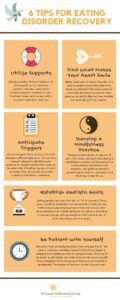6 Tips for Eating Disorder Recovery

Whether you are navigating eating disorder recovery for the first time or have been here before, a common question we often get is, ‘So, how do I recover?’ This can be a difficult question to answer because what works for one person may not necessarily work for another. While there is no manual for exactly how to recover from an eating disorder, I’ve compiled some tried and true action steps that can help move you forward in your healing journey.
Connect With Others:
Eating disorders thrive in isolation. To set yourself up for continued recovery success, reach out to trusted supports, members of your treatment team, and connect with a recovery community near you.
Find What Makes Your Heart Smile:
When living with an eating disorder, it is easy to neglect everything that once made you feel alive. Recovery gives us more time and space to explore what gives us joy and to discover new hobbies and activities to fill our hearts.
Anticipate Triggers:
As you navigate life in recovery, stressful situations will inevitably arise. You can help prevent relapse by identifying and planning for triggers before they come up. Develop a list of healthy coping skills and remember them as you are faced with triggering scenarios or situations.
Develop a Mindfulness Practice:
Eating disorders impact all aspects of self, mind, body, and spirit. Developing a mindfulness practice can help ground us to the present, (re)connect with ourselves, and guide us toward a greater appreciation for our bodies and the things it does for us.
Establish Realistic Goals:
Setting goals is an important part of life in recovery. These goals should be attainable and measurable so that you can track your process and be proud of how far you’ve come. Some examples can include meal plan compliance, attending a recovery group, setting boundaries with a loved one, or even attending a party or event.
Be Patient with Yourself:
Recovery from an eating disorder is not ‘one size fits all.’ Be sure to continue reminding yourself of this if you begin to compare your healing process to someone else’s. It’s okay to be eager to get better, but make sure you also give yourself some compassion if it’s not going at the pace you wanted or anticipated. The beauty of recovery is that it is your own.

